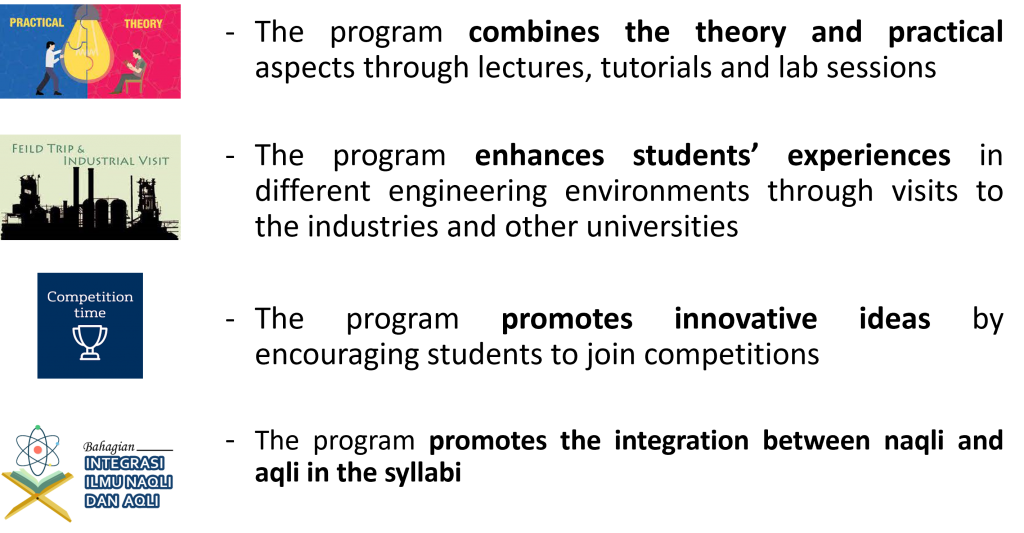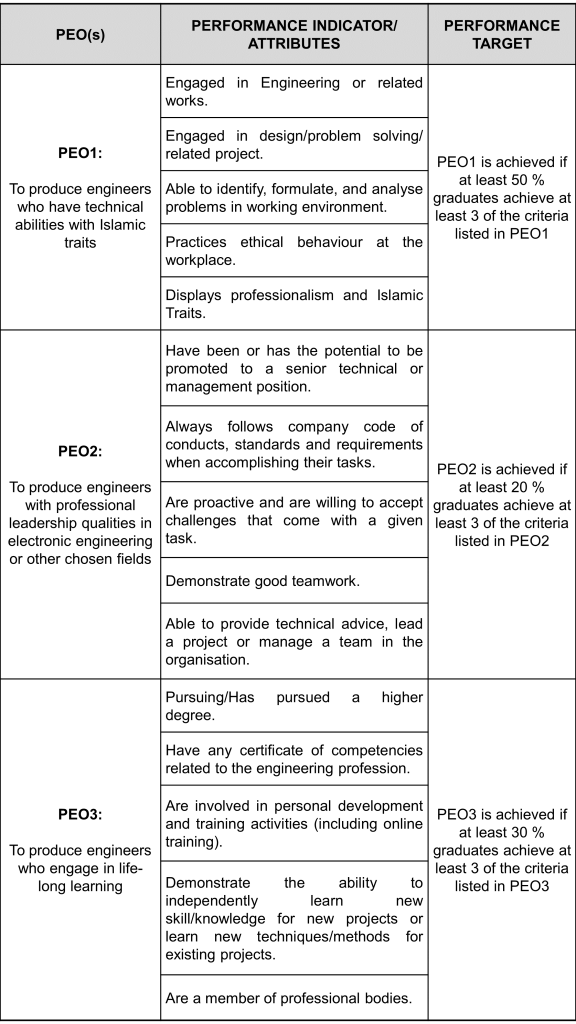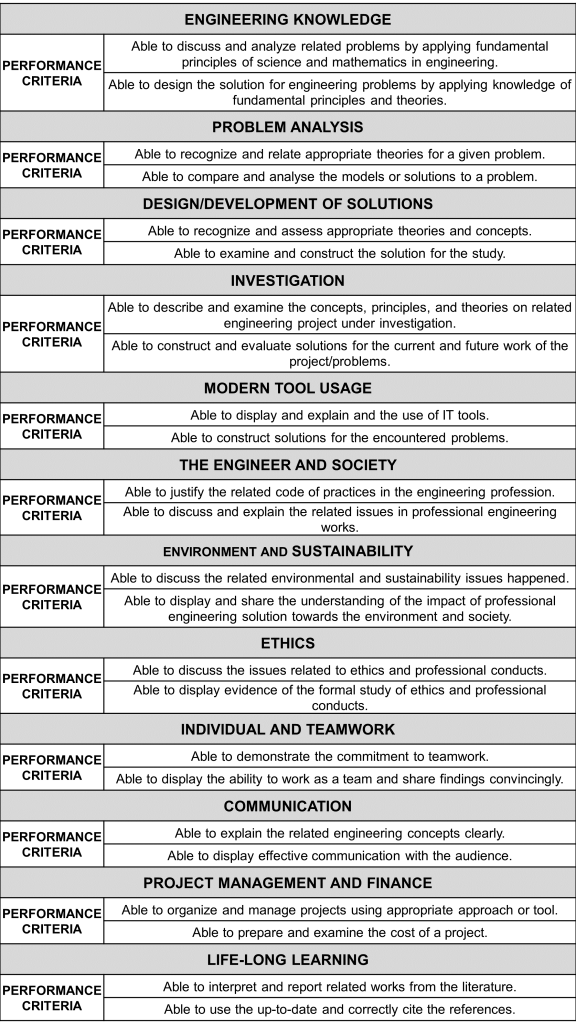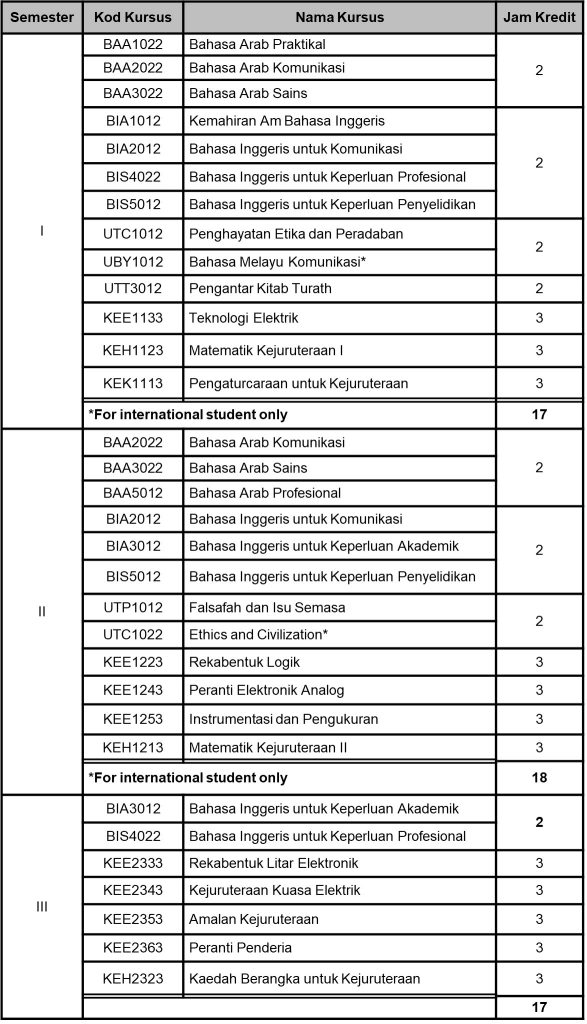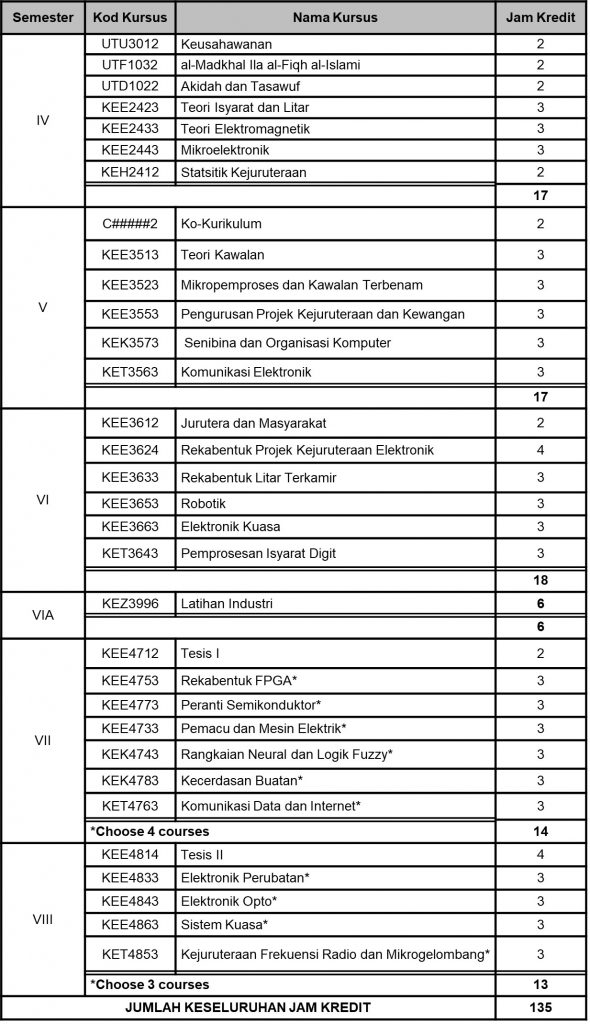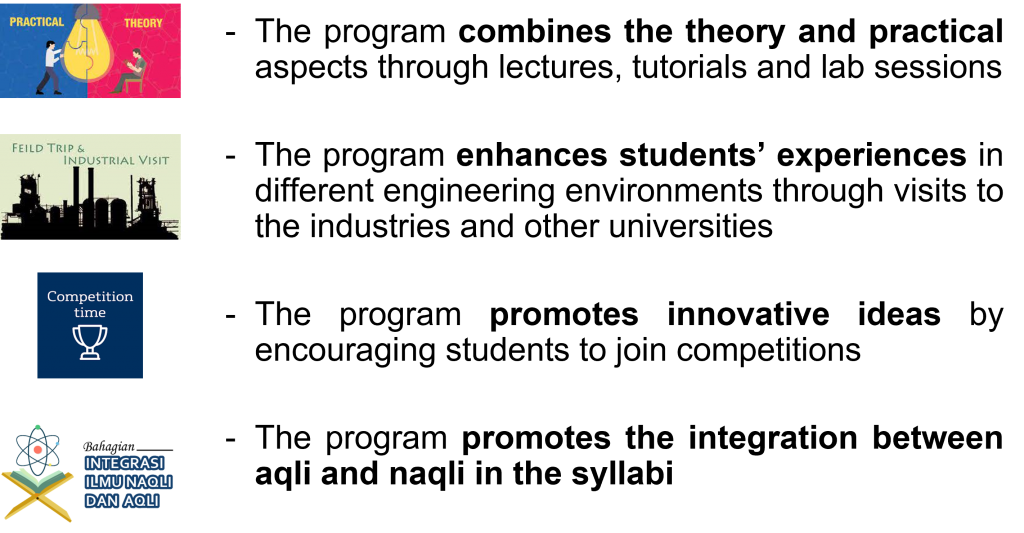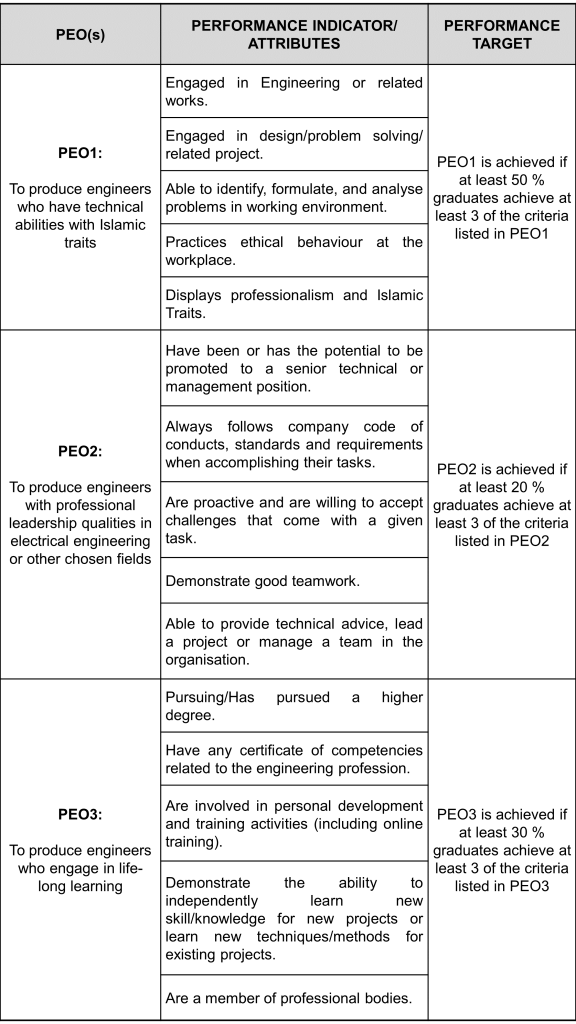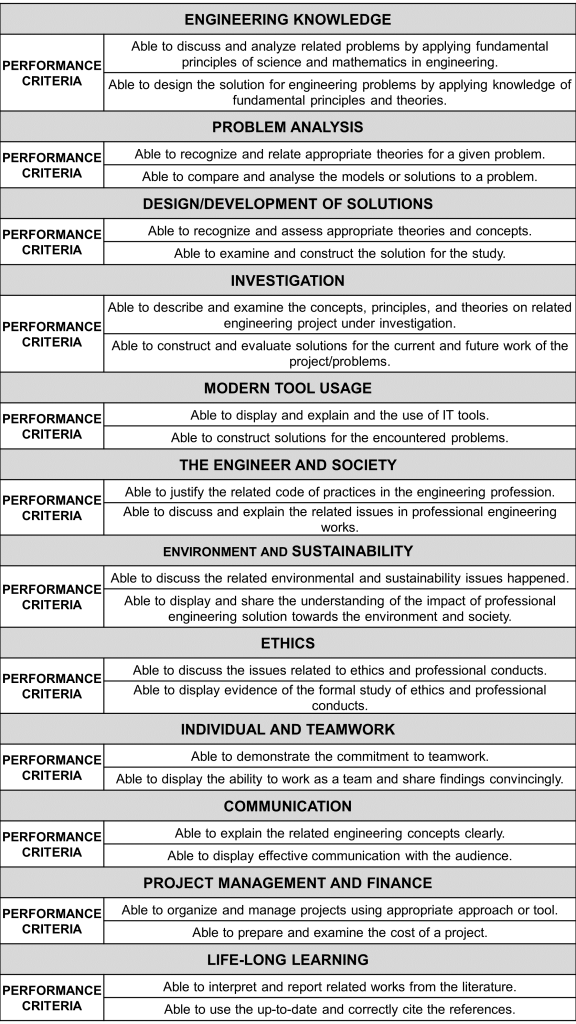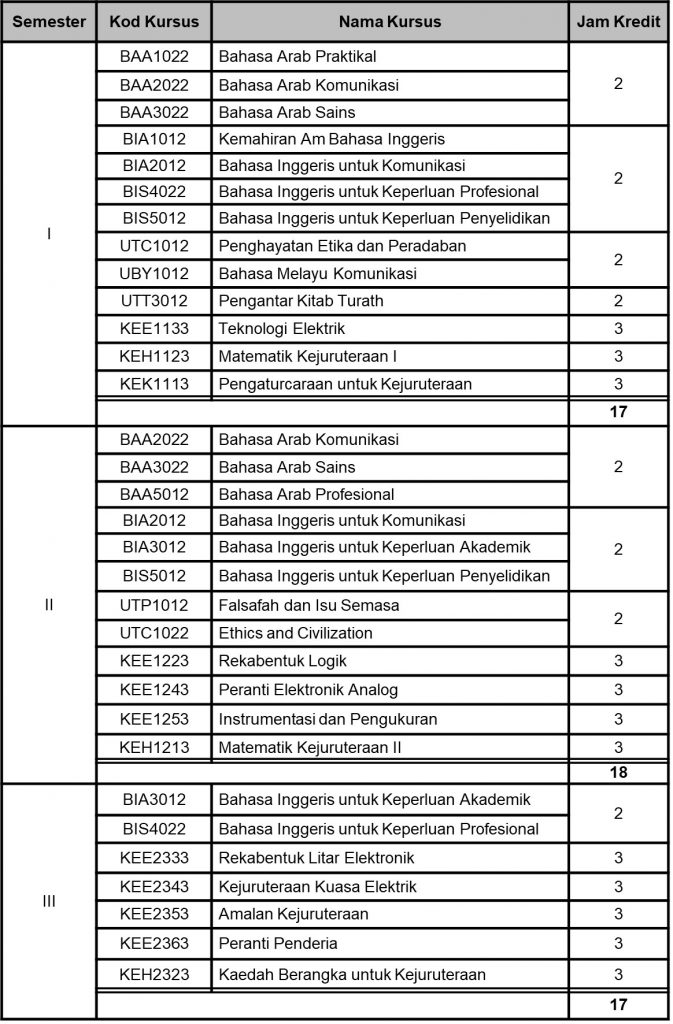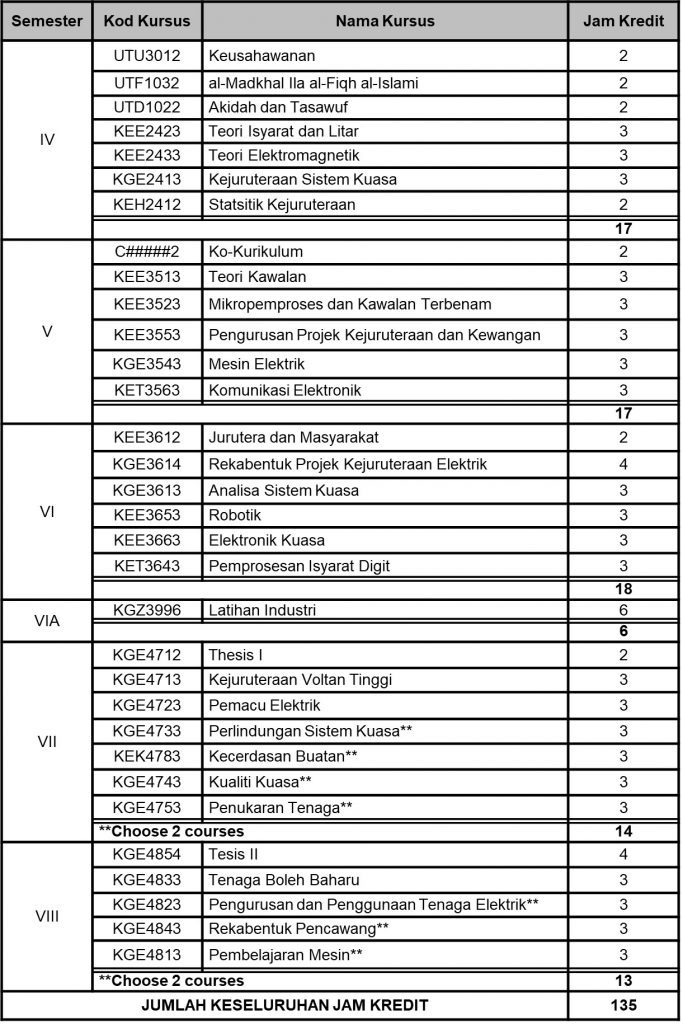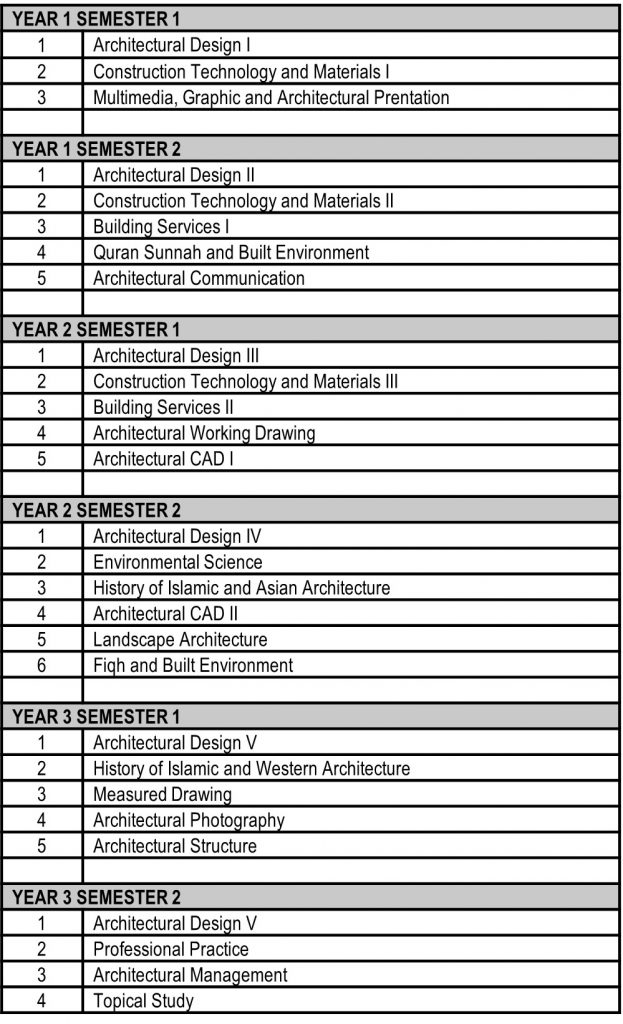Bachelor of Electronic Engineering with Honours
Bachelor of Electronic Engineering with Honours (QK86)
PEO1: To produce engineers who have technical abilities with Islamic traits
PEO2: To produce engineers with professional leadership qualities in electronic engineering or other chosen fields
PEO3: To produce engineers who engage in life-long learning
Students of an Electronic Engineering program are expected to attain the following POs:
PO1: Engineering Knowledge – Apply knowledge of natural science, mathematics, engineering fundamentals, or electronic engineering as specified in WK1 to WK4 respectively to solve complex engineering problems;
PO2: Problem Analysis – Identify, formulate, conduct research literature, and analyze complex engineering problems reaching substantiated conclusions using first principles of natural science, mathematics, engineering fundamentals, or electronic engineering (WK1 to WK4);
PO3: Design/Development of Solutions – Design solutions for complex engineering problems and design systems, components or processes that meet specified needs with appropriate consideration for public health and safety, cultural, societal, or environmental considerations (WK5);
PO4: Investigation – Conduct investigation of complex engineering problems using research-based knowledge (WK8) and research methods including design of experiments, analysis and interpretation of data, and synthesis of the information to provide valid conclusions;
PO5: Modern Tool Usage – Create, select or apply appropriate techniques, resources, and modern engineering and IT tools, to complex engineering problems, with an understanding of the limitations (WK6);
PO6: The Engineer and Society – Apply reasoning informed by the contextual knowledge to assess societal, health, safety, legal and cultural issues and the consequent responsibilities relevant to professional engineering practice and solutions to complex engineering problems (WK7);
PO7: Environment and Sustainability – Understand and evaluate the sustainability and impact of professional engineering work in the solutions of complex engineering problems in societal and environmental contexts. (WK7);
PO8: Ethics – Apply ethical principles and commit to professional ethics and responsibilities and norms of engineering practice (WK7);
PO9: Individual and Team Work – Function effectively as an individual, and as a member or leader in diverse teams.
PO10: Communication – Communicate effectively on complex engineering activities
PO11: Project Management and Finance – Demonstrate knowledge and understanding of engineering management principles and economic decision-making and apply these to one’s own work, as a member or leader in a team, to manage projects.
PO12: Life Long Learning – Recognize the need for, and ability to engage in independent and life-long learning.
The Department of Electronic and Electrical Engineering, Faculty of Engineering and Built Environment, USIM has received full recognition for the program from the Malaysian Qualifications Agency (MQA) and the Program Accreditation Body, the Engineering Accreditation Council Malaysia (EAC).
(Kindly refer to the attachment for certificates from MQA and EAC)
The program is capable of producing versatile graduates as it produces graduates who are capable of designing, researching, communicating, and the entrepreneurial spirit that has been instilled throughout their studies in the field of electronic engineering. This factor gives an advantage to electronic engineering graduates to venture into a wider field of employment. Among the fields that versatile electronic engineering graduates can venture into are:
- Biomedical Engineer
- Robotics Engineer
- Maintenance Engineer
- Instrumentation & Control Engineer
- Telecommunication Engineer
- Electronics Engineer
- Design Engineer
Bachelor of Electrical Engineering with Honours
Bachelor of Electrical Engineering with Honours (QK87)
PEO1 :To produce engineers who have technical abilities with Islamic traits
PEO2 : To produce engineers with professional leadership qualities in electrical engineering or other chosen fields
PEO3 : To produce engineers who engage in life-long learning
Bachelor of Electrical Engineering with Honours (QK87)
Students of an Electrical Engineering program are expected to attain the following POs:
PO1 : Engineering Knowledge – Apply knowledge of natural science, mathematics, engineering fundamentals, or electrical engineering as specified in WK1 to WK4 respectively to solve complex engineering problems;
PO2 : Problem Analysis – Identify, formulate, conduct research literature, and analyze complex engineering problems reaching substantiated conclusions using first principles of natural science, mathematics, engineering fundamentals, or electrical engineering (WK1 to WK4);
PO3: Design/Development of Solutions – Design solutions for complex engineering problems and design systems, components or processes that meet specified needs with appropriate consideration for public health and safety, cultural, societal, or environmental considerations (WK5);
PO4 : Investigation – Conduct investigation of complex engineering problems using research-based knowledge (WK8) and research methods including design of experiments, analysis and interpretation of data, and synthesis of the information to provide valid conclusions;
PO5 : Modern Tool Usage – Create, select or apply appropriate techniques, resources, and modern engineering and IT tools, to complex engineering problems, with an understanding of the limitations (WK6);
PO6 : The Engineer and Society – Apply reasoning informed by the contextual knowledge to assess societal, health, safety, legal and cultural issues and the consequent responsibilities relevant to professional engineering practice and solutions to complex engineering problems (WK7);
PO7 : Environment and Sustainability – Understand and evaluate the sustainability and impact of professional engineering work in the solutions of complex engineering problems in societal and environmental contexts. (WK7);
PO8: Ethics – Apply ethical principles and commit to professional ethics and responsibilities and norms of engineering practice (WK7);
PO9 : Individual and Team Work – Function effectively as an individual, and as a member or leader in diverse teams.
PO10: Communication – Communicate effectively on complex engineering activities
PO11: Project Management and Finance – Demonstrate knowledge and understanding of engineering management principles and economic decision-making and apply these to one’s own work, as a member or leader in a team, to manage projects.
PO12: Life Long Learning – Recognize the need for, and able to engage in independent and life-long learning.
The Department of Electronic and Electrical Engineering, Faculty of Engineering and Built Environment, USIM has received provisional accreditation for the program from the Malaysian Qualifications Agency (MQA) and the Program Accreditation Body, the Engineering Accreditation Council Malaysia (EAC).
(Kindly refer to the attachment for more info)
The program is capable of producing versatile graduates as it produces graduates who are capable of designing, researching, communicating, and the entrepreneurial spirit that has been instilled throughout their studies in the field of electrical engineering. This factor gives an advantage to electrical engineering graduates to venture into a wider field of employment. Among the fields that versatile electrical engineering graduates can venture into are:
- Electrical Engineer
- Power Engineer
- Project Manager
- Renewable Energy Engineer
- Transmission Engineer
- Commissioning Engineer
- Service and Site Engineer
- Sales Engineer
- Researcher
Bachelor of Science in Architecture with Honours
Welcome to the School of Architecture, Faculty of Engineering and Built Environment, Universiti Sains Islam Malaysia, the only school in Malaysia that offers architecture studies based on the integration of Naqli and Aqli knowledge!
Bachelor of Science in Architecture with Honours Program began in September 2012. The duration of the program is 3 years (6 semesters) and is conducted on a full-time studio-based basis. This unique program combines creative practices of architectural design with cultural, social, technical and sustainability of the built environment. We provide a vibrant and collaborative environment for teaching and research. We foster a strong studio culture, encouraging students to confront complex situations and issues with intelligence and creativity.
In this studio-based degree, you’ll study all aspects of architecture focusing on five clusters of knowledge and skills, namely Design, Technology and Environment, Cultural Context, Communication and Management Practice, and Law. You will be participating in studio learning, guided by highly qualified academicians and industry practitioners, and also collaborating with your peers in small groups to develop responses to a wide range of social and spatial issues. Studio learning replicates the way many architectural and design practices operate. You’ll also learn how to visually communicate your ideas through developing skills in drawing presentation, model making, animation, visualization, digital fabrication, and live presentation. At the end of your degree, you’ll be able to use your facility for creative and rational inquiry to analyze and provide solutions to design problems.
The strength of this program is the Islamic approach used in the delivery of architectural knowledge. Creativity, curiosity, and strong intellectual grounding surrounded by a learning environment based on Islamic values are central to the course. The integration of Naqli and Aqli knowledge applied in this program will produce architecture graduates who understand the built world in the context of Islam, are proficient with the latest technology, and have high morals as a professional Muslim (Al-Qawiyyul Amin).
| PEO1 | Memiliki kompetensi yang tinggi dalam pengetahuan Seni Bina dan mempunyai keupayaan untuk berkhidmat di peringkat separa profesional | Possess high competence in architectural knowledge and the ability to serve at a semi-professional level |
| PEO2 | Berpegang teguh kepada sikap dan etika seorang profesional Muslim yang diperlukan dalam memenuhi tanggungjawab mereka terhadap Allah dan masyarakat | Adhere to the attitude and ethics of Muslim professionals in fulfilling their responsibilities to Allah and society |
| PEO3 | Mempunyai kebolehan yang tinggi dalam menyesuaikan diri terhadap pengetahuan baru melalui pendidikan sepanjang hayat | Ability to adapt to new knowledge through lifelong learning |
| PEO4 | Memenuhi kehendak industri dengan kemahiran komunikasi yang cemerlang, kebolehan memimpin dan kemahiran keusahawanan | Meet the needs of the industry through excellent communication skills, leadership abilities, and entrepreneurial skills |
| PEO5 | Memenuhi kriteria untuk bekerja dalam mana-mana disiplin Alam Bina yang berkaitan oleh organisasi tempatan dan juga antarabangsa | Meet the criteria to work in the relevant built environment discipline in local and international organizations |
| PLO1 | Memperoleh dan menggunakan pengetahuan asas Seni Bina berintegrasikan ilmu Naqli dan Aqli | Acquire and use basic knowledge of Architecture that integrates the knowledge of Naqli and Aqli |
| PLO2 | Mengenalpasti, menganalisis dan merumuskan isu reka bentuk dan pembangunan lestari dalam bidang Seni Bina | Identify, analyze and conclude issues of design and sustainable development in the field of Architecture |
| PLO3 | Mempunyai pengetahuan dan kemahiran praktikal dalam bidang Seni Bina | Has practical knowledge and skills in the field of Architecture |
| PLO4 | Berupaya bekerjasama dan memberi sumbangan secara berkesan dalam pasukan | Able to collaborate and contribute effectively in a team |
| PLO5 | Berupaya menyampaikan idea melalui kaedah komunikasi yang berkesan | Able to convey ideas through effective communication methods |
| PLO6 | Berkemahiran menggunakan pelbagai peranti digital dan perisian yang bersesuaian untuk menghasilkan tugasan yang berkualiti | Proficient in using a variety of digital devices and appropriate software to produce quality work |
| PLO7 | Berkemahiran melaksanakan penilaian numerikal dalam asas reka bentuk struktur bangunan | Possess skills in performing numerical assessments in building structural design |
| PLO8 | Berupaya memimpin, bertanggungjawab dan membuat keputusan yang berkesan dalam pasukan | Able to lead, take responsibility and make effective decisions in the team |
| PLO9 | Berupaya menerapkan pembelajaran sepanjang hayat | Able to apply lifelong learning |
| PLO10 | Berupaya memahami pengetahuan asas keusahawanan dalam bidang Seni Bina | Able to understand the basic knowledge of entrepreneurship related to Architecture |
| PLO11 | Berupaya memahami etika dan profesionalisme yang selari dengan prinsip Islam dan kesenibinaan | Able to understand ethics and professionalism in line with Islamic principles and Architecture |
The Department of Architecture, Faculty of Engineering and Built Environment, USIM has received full recognition from the Malaysian Qualifications Agency (MQA) and the Program Accreditation Body, the Malaysian Board of Architects (LAM).
(Kindly refer to the attachment for certificates from MQA and LAM)
The program is capable of producing versatile graduates as it produces graduates who are capable of designing, researching, communicating, and the entrepreneurial spirit that has been instilled throughout their studies in the field of Architecture. This factor gives an advantage to Architecture graduates to venture into a wider field of employment and is not limited to the field of architecture alone. Among the fields that versatile Architecture graduates can venture into are:
- Graphic art
- Computing graphics and multimedia
- Interior design
- Landscape design
- Furniture design
- Photography
- Project management
- Building management
- Various fields in the construction industry such as developer, contractor, and manufacturer of building materials
- Researchers
- Historians and conservationists
- Architectural criticism
- Journalist or author of a book
- Curator
- Local government administrators
- Other areas that require creativity and opportunities to innovate

